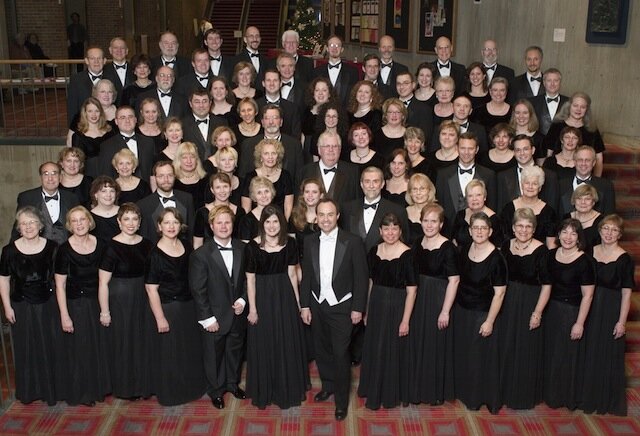Chorus America’s annual conference is being held in Seattle next week, from June 12 to the 15th. This is also the centenary of the great 20th century English composer Benjamin Britten’s birth, and many of his works are being performed around Seattle. The two occasions come together with the performances by Seattle Symphony, its Chorale, Seattle Pro Musica, and Seattle Boychoir of his mighty War Requiem this Thursday and Saturday at Benaroya Hall.
First however, Seattle Choral Company has played its part with a performance Saturday night at St. Mark’s Cathedral of three shorter Britten works, including the Cantata Misericordium, which some consider a postscript to the Requiem. He wrote it in 1963, the year after the premiere of the Requiem (which had been commissioned to celebrate the reconsecration of the rebuilt Coventry Cathedral after it was bombed to bits in WWII).
While the Requiem is about the horror and destructiveness of war (as Britten quotes from WWI poet Wilfred Owen: “My subject is War and the pity of War”), Cantata Misericordium is about the chances of compassionate action to relieve suffering after violence. It was commissioned by the international Red Cross to celebrate its 100th anniversary, and Britten chose to set the parable of the Good Samaritan, employing Latin as a universal language.
As he did with the Requiem he wanted soloists from previously warring countries, and for both he wanted English tenor Peter Pears, and German baritone Dietrich Fischer-Diskau.
Seattle Choral Company founder and artistic director Freddie Coleman chose tenor Eric Neuville to sing The Samaritan and baritone Charles Robert Stephens to sing The Traveler, with the full chorus as narrator and commentator and accompanied by small orchestra. These were good choices, particularly Stephens, a fine dramatic singer who portrayed expressively his apprehensiveness and fear, then fright and hurt after being set upon by the thieves. The chorus could have been a bit more outraged at the cold response from the priest at the Traveler’s calls for help, but were more shocked at the Levite’s similar response.
Neuville could have used more drama in his initial discovery of the injured man but became steadily more expressive as the work continued. Despite being in Latin, the story is so well known it was easy to follow, and the English words were side by side with the Latin ones. Britten’s music surrounds and lifts the story, spurring it onward and wrapping the whole together.
Prior to the Cantata, SCC sang two 1940s works of Britten set to words of the poet W.H. Auden. The chorus’s Cappella group opened the concert from the back of the cathedral with a fine performance of the Chorale after an Old French Carol, a stately prayer and intercession, becoming more passionate as it continues.
It followed this with the Hymn to St. Cecilia, which was less successful. After the first stanza and the repeated chorus, Auden’s words become somewhat odd and increasingly cryptic for what is usually a paean to the goddess of music, and the program notes leaned heavily on Auden’s harsh and unkind attitude towards Britten.
The music itself is glorious, but needs clarity in the harmonic lines, with the pure sopranos sounding separate, floating on top. SCC has an excellent soprano section and good soloists, but somehow the separation and the clarity weren’t there. They did better in the second section which needs to be light and almost disembodied, but somehow the whole performance felt like a painting which needs cleaning in order to see the clear colors intended by the artist, in this case, Britten. And, to really hear the music, one needs to ignore the baggage of Auden’s and Britten’s discordant relationship.
After intermission, SCC introduced the audience to the music of Norwegian composer Ola Gjeilo, with two works, Dark Night of the Soul and its companion, Luminous Night of the Soul, performed without interruption. Gjeilo uses small orchestra and piano to accompany the chorus, and his intent is to make the piano not an accompaniment but an equal partner. These are works which range from minimalist piano with long choral lines over it, to gentle slow melodies to spare harmonies to rippling piano in rich Rachmaninoff style. The combination of piano solos interleaved with the choral line works well, though words were hard to hear. Pianist Lisa Bergman handled her role with ease and excellent attention to balance with the singers.
